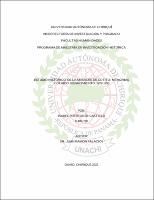Estudio histórico de la masacre de Cotito: memorias y olvido, renacimiento, 1928-1953.
Abstract
Con el propósito de realizar un aporte a la historiografía panameña, se ha realizado esta
investigación que tiene como objetivo el presentar un Estudio Histórico de la Masacre de
Cotito y su vínculo con las memorias y el olvido, en Renacimiento (1928-1953). Por medio
del alcance descriptivo, se identifican las situaciones pasadas, presentes y futuras sobre este
suceso histórico. Se realizarán entrevistas a diez personas de tercera edad, nacidas entre 1929
a 1953, relacionadas con este hecho histórico. Los sobrevivientes afirman que ni siquiera
hubo una disculpa por parte del Gobierno panameño; y lo único que se ha hecho en honor
a ellos fue develar una placa con una síntesis del hecho histórico y el nombre de los
sobrevivientes en el lugar. Según las entrevistas aplicadas, se concluye que la Masacre de
Cotito fue un hecho circunstancial; se manejan aproximadamente cuatro versiones: la mala
comunicación producto de no entender el idioma, fue el factor más importante para que se
dieran los hechos; el consumo de alcohol por los miembros de la Policía Nacional; la
negativa de los colonos ante el registro de extranjería; ningún país extranjero tuvo injerencia
directa en este desafortunado evento. This research titled Leaming Strategies and English Language Communicative
Competences at official universities in the district of David (Universidad Aut6noma de
Chiriqui and Universidad Especializada de las Americas) attempts to evaluate the
teaming strategies used by tourism students as well as their acquisition of English
communicative competence. It also proposes strategic guidelines that would facilitate
tourism students their efforts to acquire, to leam and to develop English communicative
competence.
The paradigm of this research is a positive, quantitative, descriptive type. It is
transectional, since the data was collected in a single moment, in order to analyze and
to relate them. It is a field investigation where a direct observation was made and
information was collected. The method used in the research was correlational and
projective, explanatory, with a non-experimentaltransectionaldesign.
In this research we worked with two variables: Learning strategies and communicative
competence of the English language. The leaming strategies which influence the
acquisition of English communicative competence were analyzed.
These variables were studied in two universities: Universidad Aut6noma de Chiriquf -
UNACHI - and Universidad Especializada de las Americas - UDELAS - in the
undergraduate degrees in tourism. The units of analysis were made up of a totalof 175
students and 20 teachers From both universities and the information was collected using
the survey technique. As instrument, two questionnaires addressed to the studied
sample were used with five altemative answers: always, sometimes, almost always,
almost never and never. It was validated through the consultation of three experts.
Reliability was calculated by the Crombach alpha coefHlcient resulting in 0.97 for
professors and 0.96 for students in both variables. It was concluded that teachers need
to comply with the new strategies that generate teaming in students so that the
communicative skills of English can be incorporated in a significant way in the
students pursuing the degree in tourism. New leaming stmtegies for the achievement of
communicative competence should be implemented.
This research experience proposes "strategic guidelines for the acquisition of the
English language in UNACHI and UDELAS", with a solid theoretical base that aims at
offering a response to English professors and students of tourism of both universities so
they would be able to communicate in English.

